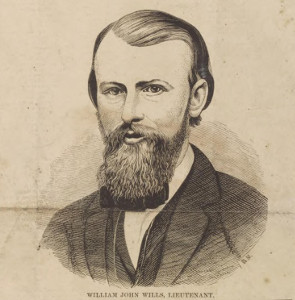[Editor: This article about William John Wills, of the Burke and Wills expedition, was published in A Tribute to the Memory of Burke and Wills (broadsheet), 1862.]
William John Wills.

William John Wills was born at Totness, in Devonshire, England, in the year 1834, and arrived in the Colony of Victoria, in 1853, the same year in which Mr. Burke reached it. He was the son of a Physician, and had, under the care of his father, devoted many years to the various branches of physical science which are necessary to fit one for the Medical Profession. Young Wills received his academical education at Ashburton, a grammar school endowed by the celebrated William Gifford and Dr. Ireland, the Dean of Westminster. Afterwards he devoted himself, with all the ardour of his inquisitive mind, to the study of Chemistry, Natural Philosophy, and Physiology. The sensation which the discovery of the immense gold-fields in Australia created in England in ’52—’53 naturally operated on a mind so susceptible as that of Wills, and he consequently joined in the great exodus from the mother country to Australia. With many other energetic and chivalrous young men he made his way to Melbourne, then the grand centre of attraction for the enterprising and enduring.
The first engagement Mr. Wills took in Australia was that of Assistant Superintendent of the Royal Bank Station at Deniliquin. In the year 1854 he met his father, who came out expressly to join him, with whom he started in business at Ballaarat. His thirst for additional scientific knowledge — astronomy in particular — led him to apply for a situation at the Melbourne Observatory, which he obtained and kept, with great credit to himself, till he joined the gallant Burke on tile grand expedition to the Gulf of Carpentaria.
Wills possessed a most amiable character. — His attachment to Burke, his devotion to the cause of science, his heroic endurance during the last days of his life, and his profound but unostentatious religious fervour, fully entitle us to rank him among the many great men who are an honour to our common humanity.
Source:
A Tribute to the Memory of Burke and Wills (broadsheet), South Sydney (NSW): W. T. Baker, [1862]
Leave a Reply